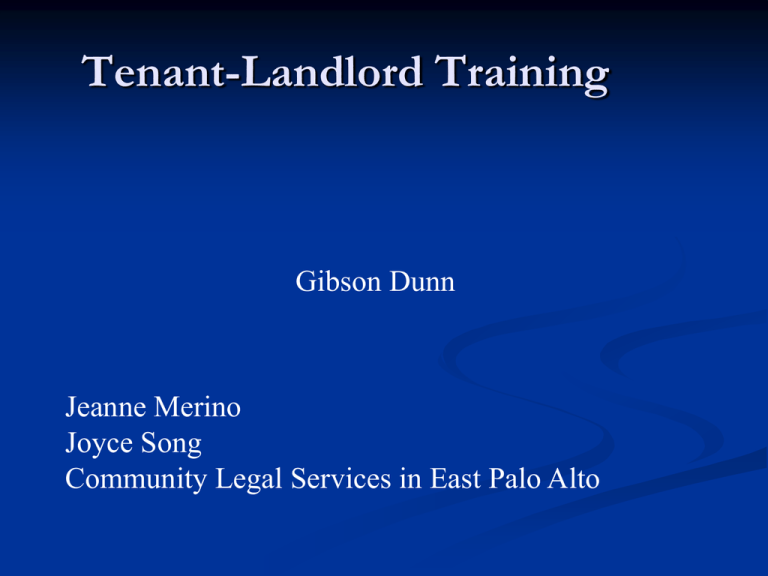
Tenant-Landlord Training
Gibson Dunn
Jeanne Merino
Joyce Song
Community Legal Services in East Palo Alto
Overview of Training
CLSEPA Intake Sessions
During the Tenancy
Goals
Mechanics
Habitability
Rent
Fair Housing
Odds and Ends
Ending the Tenancy
With and Without Cause
Process
Security Deposits
Goals
Goals of CLSEPA Housing Law Practice
Maintain and increase decent, safe, and affordable
housing for low-income people on the Peninsula,
with a focus on East Palo Alto;
Work with tenants to increase knowledge of their
rights, and develop and refine problem-solving skills;
Work with tenants to keep them in their homes and
smooth their transition to new homes.
Timeline of Development in EPA
1983: EPA Incorporated as a city
1989: Passes parcel tax
1987-93: Pursues plan to bring Adobe HQ
1988-90: Pursues plan to bring Sun campus
1992: “Murder capital”
1995: Parcel tax struck down in court
1995: Passes plan for Ravenswood 101
1997: Passes plan for University Circle
2000: Whiskey Gulch torn down
2012: California eliminates Redevelopment Agencies
1960 Census
East Palo
Alto
White
72.0%
Black
22.0%
All Other
6.0%
White
Black
Other
1970 Census
East Palo
Bay Area
Alto
White
34.0%
86.4%
Black
61.0%
7.9%
Indian
0.3%
0.4%
Japanese
1.9%
1.1%
Chinese
Filipino
All Other
1.0%
1.5%
0.6%
White
Black
Indian
Japanese
Chinese
Filipino
2.1%
1.2%
0.9%
All Other
2010 Census
East Palo Bay
Alto
Area
White
6%
42%
Black
16%
6%
American Indian
0%
0%
Asian
4%
23%
Pacific Islander
7%
1%
Other Races
2%
4%
Hispanic or Latino
64%
24%
White
Black
American Indian
Asian
Pacific Islander
Other
Hispanic or Latino
Goals of Housing Intake Clinics
To efficiently assist individual clients to resolve their
housing problems;
To resolve housing problems before they get too
unwieldy, and keep people in their homes;
To provide a venue for lawyers, legal assistance, and
clients to strategize about how to reach client’s goals;
To leverage CLSEPA’s resources
Mechanics: Intake
Meet a half hour before clients come to review
issues – but be flexible for unexpected changes!
Interview-Consult with Attorney-Return to
client to determine process going forward
Post-interview
All interviewers will write an intake memo
Most interviewers will write a demand letter
Other follow-up possible
Mechanics: Interview
Purposes
Determine housing problem and client’s goals
Get information
Establish good working relationship
Don’t give any advice without checking with
attorney!
Bring pen & paper for interview
Bring laptop for research (and drafting)
Interview Process
Start with Explanation of the Process
Paperwork
Who you are (non-lawyer supervised by lawyers)
All ethical obligations of an attorney
No charge
We will figure out at the end what we can help with
Conflict’s check, intake sheet, brief services form
Get the client’s story
Consult with Attorney
Make copies of everything! Originals stay with client
Decide what we can help with
During the Tenancy
Rent Increases and other Changes in Terms
Habitability
Fair Housing
Odds and Ends
How much rent can LL charge?
Initial rent is market-driven
No limitations under EPA Rent Ordinance for
initial rent (vacancy decontrol)
But new tenant in EPA is protected by rent
stabilization (without regard to what prior tenant
paid)
Rent
Landlords
must give written receipt!!!
Civil Code Section 1499
Rent Increases in EPA
Limitations under Rent Stabilization Ordinance
Landlords not exempt must register
Vacancy decontrol
Administrative Board establishes AGA (around 2%)
Landlords can “bank” increases for 3 years
Only one increase per year
No more than 10% in a 12-month period
Does not apply to single family homes
Rent Increases Outside of EPA
Landlord must wait until the end of the term of
tenancy (i.e. yearlong lease)
No limit per year
30-days notice if rent is increased 10% or less
60-days notice if rent is increased more than
10%
Civil Code Section 1013(a)
Exceptions: Section 8 tenancies, mobile home
tenancies, floating tenancies
Source of Habitability Obligation
Warranty
of Habitability at Common
Law
Statutes and Regulations
Provision of the Rental Contract
Rent Stabilization Ordinance in EPA
Tort Liability
Statutes and Regulations
Landlord obligated to put premises into a
condition fit for residential occupation and
to repair all conditions that render the unit
untenantable. But tenant is obligated to
repair damages caused by herself, children,
guests.
Cannot be waived.
Civil Code Section 1941.
What is “untenantable”?
Failure to provide effective:
weatherproofing, electricity, plumbing and
gas, heating, hot and cold water, stairways,
floors and railings, working locks on doors
and windows, smoke and carbon monoxide
detectors. Premises free of rodents, vermin
and lead hazards.
Cal. Civil Code Section 1941.1 and Health and Safety Code Section
17920.3 and Calif Code of Regulations Section 1 et seq.
EPA Rent Ordinance
Failure
to Maintain Premises
Decrease in Services (broader than
statutory requirements)
Can
result in a downward rent
adjustment until the problem is
fixed
EPA Rent Stabilization Ordinance, Section 18
(Passed June 2010)
Remedies for Habitability Issues
If
emergency,
call
fire department,
PG&E,
Code Enforcement of City and County
Environmental Health
Non-emergencies . . .
Written request to repair (verbal okay but not
ideal)
Inspection
Repair and Deduct
Tenant’s Petition for Rent Adjustment (EPA)
Small Claims/Superior Court Action
Administrative Process with Code Enforcement
Repair and Deduct
Risky!
Only for problems that affect the “tenantability”
Notice required, + “reasonable time to repair”
30 days presumed reasonable
Maximum of one month’s rent each time right is
exercised
Only twice in a 12-month period
Civil Code Section 1942
Fair Housing
Protected Classes
Race
Religion
National origin/ancestry
Sex ( including sexual harassment)
Sexual Orientation
Family/Marital Status
Children
Age
Source of Income
Source of Right
Federal Fair Housing Act
Federal Fair Housing Amendments Act
Cal FEHA
Unruh Act
Local Ordinance
Odds and Ends
Landlord’s right of access
Civil Code Section 1954
Changing Terms of Tenancy
Civil Code Section 827(a)
Terminating the Tenancy
East Palo Alto RSO requires good cause for
eviction
In non-good cause jurisdictions, without cause,
after initial term of tenancy, written notice:
30 days (if tenancy of less than a year)
60 days (if tenancy of more than a year)
60-day notice (mobile home)
90-day notice for Section 8
Grounds for Eviction
Outside of EPA, no grounds needed if proper
notice (but not retaliatory)
90-day for eviction due to foreclosure (not EPA)
3-day notice (in alternative if breach can be
cured)
Non-Payment of Rent
Notice to Cure Covenant or Quit
Incurable breach
Assignment/sublet contrary to lease provision
Commission of waste, nuisance, dealing drugs
No Landlord Self-Help
File lawsuit in court to evict – usually an
Unlawful Detainer
Notice alone does not give landlord the right to
force out tenant
Landlord can’t change locks, move out personal
property, turn off utilities, etc.
Statutory damages of $100 per day for self-help
eviction.
What is an Unlawful Detainer?
Expedited
action for possession of
premises – 3 to 5 weeks
Priority in setting for trial
Possession is the only issue
Eviction by sheriff by writ after
Judgment entered and writ issued
Anatomy of a UD
Notice to quit
Landlord Files/Serves Summons and Complaint
Tenant Files Answer/Other Response or Tenant Does Nothing
LL files Memo to Set Case for Trial
LL obtains default
T files Counter-Memorandum
Trial: set within 8-20 days of LL memo
Judgment for Tenant
Judgment for LL Writ of Possession
Sheriff posts Notice to Vacate T files for
stay of eviction
Defending the Eviction
Deny the statements in the Complaint (judicial
form) (general and special denials)
No breach
Rent paid; LL would not accept rent
Establish an affirmative defense
Implied Warranty of Habitability (for nonpayment
cases)
Retaliation (for 30 or 60 day notice)
Discrimination
Equitable defenses (such as waiver)
Security Deposits
Landlord
must return within 21 days
of end of tenancy
Landlord can deduct for unpaid rent
or damaged caused by tenant other
than ordinary wear and tear
Landlord must give itemization of
deductions and receipts for work








